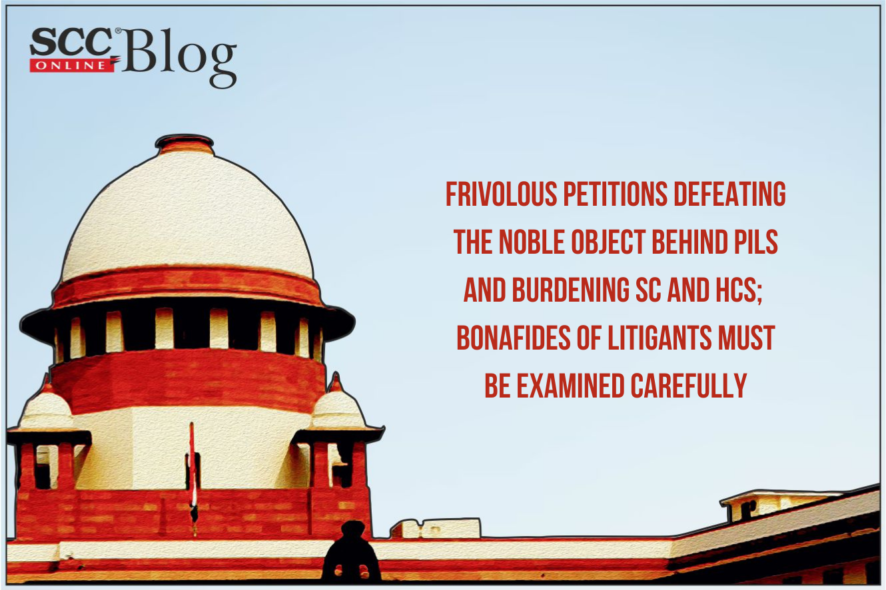Supreme Court: The 3-judge bench of NV Ramana*, CJ and AS Bopanna and Hima Kohli, JJ has urged the Courts to be cautious when examining locus standi in Public Interest Litigations in order to ensure that frivolous or private interests are not masqueraded as genuine claims.
The Court observed,
“Although the jurisprudence of Public Interest Litigation has matured, many claims filed in the Courts are sometimes immature. Thousands of frivolous petitions are filed, burdening the docket of both this Court and the High Courts. Noble intentions behind expanding the Court’s jurisdiction to accommodate socially relevant issues, in recent decades, have been critically analyzed. In our view, PIL litigation has had a beneficial effect on the Indian jurisprudence and has alleviated the conditions of the citizens in general. For those at the receiving end of the Court’s directions, we can only advise “C’est la vie”.”
Noticing the nature of PILs, the Court said that generally, PIL, being a summary jurisdiction, has limited powers to examine the bonafides of parties. It is usually on the pleadings that the Court should take a prima facie view on the bonafides of the party. If the Court concludes that the litigation was initiated under the shadow of reasonable suspicion, then the Court may decline to entertain the claims on merits. In these cases, Courts have multiple options – such as dismissing the PIL or appointing an amicus curiae, if the cause espoused in the case requires the immediate attention of the Court.
The Court was hearing a matter relating to the rights and ownership over a land, wherein the dispute regarding title was originally between one Gonsalves family and the State of Maharashtra. The land was vested into the State by an ex parte order. This order was recalled by the Revenue Minister after a Revision Application was moved by the Esteem Properties, the successors of the disputed property.
The Respondent nos. 1 and 2, however, moved the writ petition as public property belonging to the State Government was being transferred to private individuals and would lead to loss of public revenue.
The Court, however, observed that the PIL petitioners had no reason to file a public interest litigation when the subject matter was evidently a title claim between a private party and the State. It was noticed that the bonafides of the respondent nos. 1 and 2 were not considered in a proper perspective by the Bombay High Court while allowing the PIL.
The Court, also held that the PIL petitioners had no reason to file a public interest litigation when the subject matter was evidently a title claim between a private party and the State. Interestingly, the State Government itself concedes the title to the appellants herein and has filed affidavits to such effect, both before the Supreme Court and the High Court. Further, the State has clearly indicated that they do not have any interest in pursuing the ownership of the land in question and have admitted to the title of the appellants. Hence, the Court was not dealing with an ignorant or illiterate respondent; the State Government has accepted the title vesting in the Gonsalves family and subsequently in Esteem Properties.
In this light, it was held that institution of the public interest litigation was nothing more than an abuse of the process which cannot be allowed in the facts and circumstance so narrated.
[Esteem Properties Pvt. Ltd. v. Chetan Kamble, 2022 SCC OnLine SC 246, 28.02.2022]
*Judgment by: CJI NV Ramana
Counsels
For appellants: Senior Advocate Mukul Rohatgi
For State: Advocate Rahul Chitnis
For respondents (PIL Petitioners): Advocate Tapesh Kumar Singh







